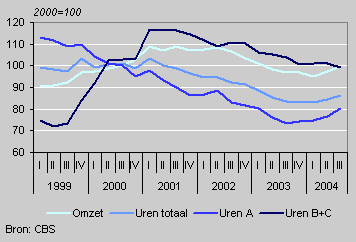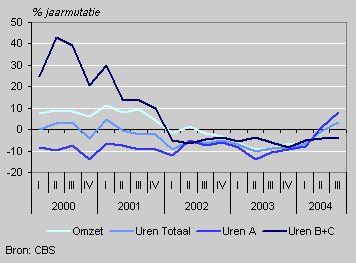Temp agency workers working more hours

The number of hours worked by agency workers (stage A) in the Netherlands was 8 percent higher in the third quarter of 2004 than in the same period in 2003.
Agency sector growing again
The employment agency sector seem to be over the worst. These positive signs might be the first response to an upswing in the economy.
Not only did the number of hours worked by agency workers increase in the third quarter, turnover in this sector also rose for the first time in two years. The increase in turnover was mainly caused by an increase in the supply of temporary workers for fixed-period projects (stage A). In these projects workers are employed without having a permanent contract with the agency.
Employment agencies: turnover and hours worked (seasonally adjusted)

Hours increasing since second quarter of 2004
After a period of more than five years in which the number of stage A hours worked by agency workers fell continuously, the number of these hours rose for two quarters in a row. In the second quarter of 2004 the increase was 1 percent on twelve months previously, in the third quarter the growth was 8 percent. According to the umbrella organisation in this sector the increased demand was especially for workers in the engineering and manufacturing sectors.
The number of hours worked by employees who do not have a permanent contract (stage B and C) fell in the third quarter of 2003. The net total number hours worked by agency workers increased by just over 3 percent.
Employment agencies: turnover and hours worked (% year-on-year change)

Positive signs from the labour market
Signs are positive in other parts of the labour market, too. In the third quarter of 2004 Statistics Netherlands measured a slight increase in the number of vacancies. After correction for seasonal affects there were 125 unfilled vacancies, 3 thousand more than in the previous quarter. Both the number of new vacancies and the number of filled vacancies were higher than twelve months previously.
Roos Schellings and Bastiaan Rooijakkers